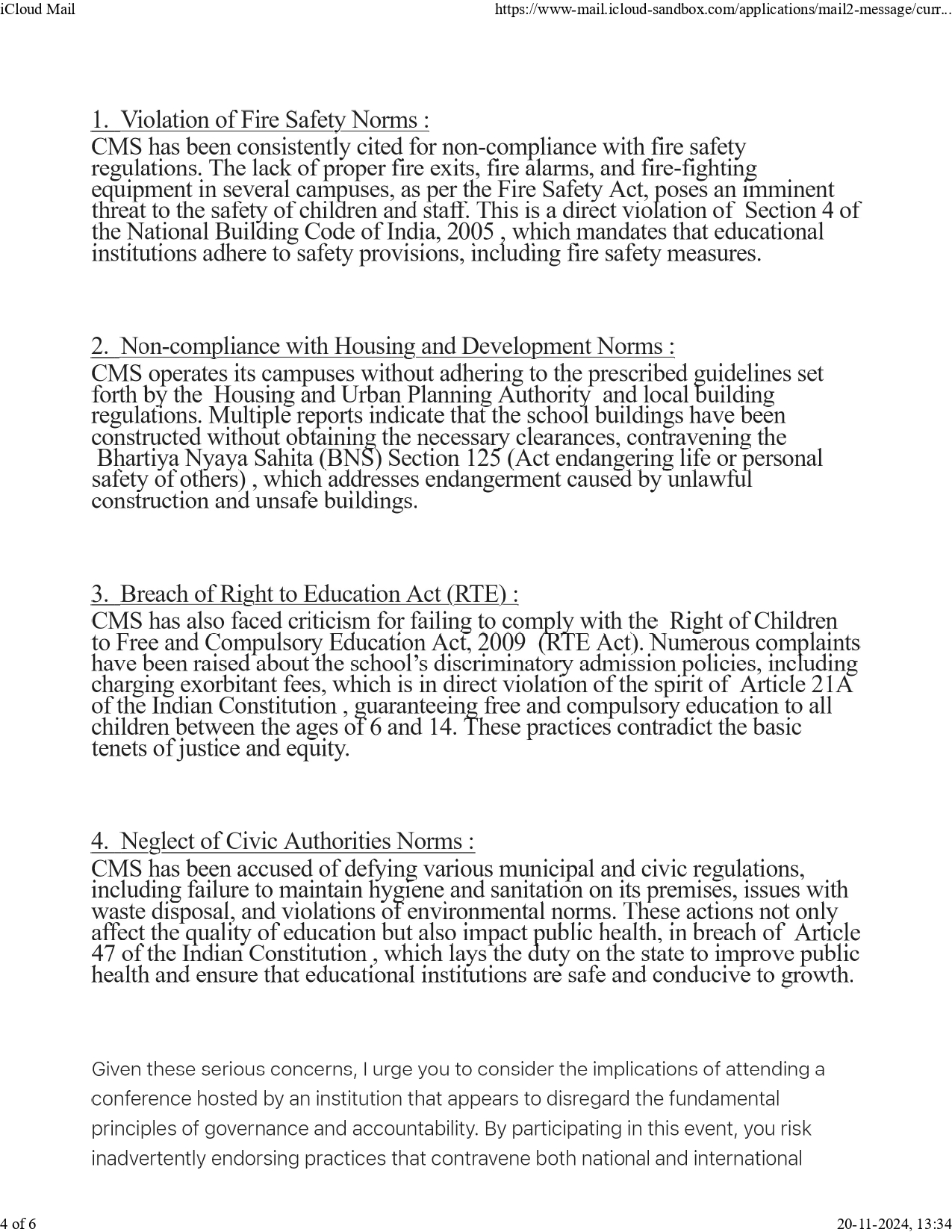Lucknow, November 23, 2024 — In a move that has stirred controversy, renowned social activist and legal rights advocate Sanjay Sharma has issued a powerful appeal to the esteemed dignitaries, judges, and legal experts set to attend the 25th International Conference of Chief Justices of the World, scheduled to take place from November 20-24, 2024, in Lucknow. Sharma has called for a complete boycott of the event, citing serious and persistent violations of legal, safety, and human rights norms by the institution hosting the conference, City Montessori School (CMS).
City Montessori School, which is recognized as one of the largest chains of private schools in India, is under intense scrutiny for a range of breaches that undermine both national and international standards of justice and governance.
The activist, in his letter addressed to key dignitaries including the President of India, the Chief Justice of India, several Union Ministers, the Chief Minister of Uttar Pradesh, and various other high-ranking officials, has raised alarm about the school’s blatant disregard for constitutional and statutory mandates that directly affect the welfare and rights of students, staff, and the broader community.
Sharma’s letter meticulously outlines four major areas of concern:
1. Violation of Fire Safety Norms: CMS has been consistently cited for failing to adhere to crucial fire safety regulations. Reports indicate that multiple CMS campuses lack basic fire safety measures such as fire exits, alarms, and firefighting equipment, despite the requirements set out in the National Building Code of India, 2005. These failures pose an imminent risk to the lives of thousands of children and staff members, yet the management has turned a blind eye to these threats, blatantly disregarding Section 4 of the Fire Safety Act.
2. Non-Compliance with Housing and Development Norms: The school’s campuses are reportedly built without obtaining the necessary clearances from the Housing and Urban Planning Authority. The violation of local building regulations and the Bhartiya Nyaya Sahita Section 125 (Act endangering life or personal safety of others) raises critical questions about the safety and legality of CMS’s construction practices, further compromising the well-being of those within the institution.
3. Breach of the Right to Education Act (RTE): CMS has come under fire for discriminatory admission practices, charging exorbitant fees, and failing to meet the requirements of the Right of Children to Free and Compulsory Education Act, 2009 (RTE Act). This not only violates the fundamental right to education guaranteed under Article 21A of the Indian Constitution but also perpetuates inequity in an institution that should be a beacon of inclusion and opportunity for all children, irrespective of their socio-economic status.
4. Neglect of Civic and Environmental Norms: The school has also been accused of gross negligence in maintaining hygiene, sanitation, and waste disposal on its premises, with several reports highlighting unsanitary conditions. Such neglect violates both local municipal regulations and Article 47 of the Indian Constitution, which mandates the state’s responsibility to improve public health and provide safe and conducive environments for educational activities.
Sharma’s appeal, however, does not stop at merely condemning the actions of the school. He goes further to address the ethical implications for those planning to attend the conference hosted by CMS. He implores the Chief Justices and legal dignitaries who are expected to participate in this global gathering to seriously reconsider their attendance, as doing so could inadvertently endorse an institution that has shown a disregard for the most basic principles of governance, justice, and human rights.
Sharma asserts that by participating in an event hosted by an institution that flouts safety regulations, discriminates against marginalized children, and neglects its moral and legal duties, these esteemed judges and legal officials would risk tarnishing the integrity of the conference. Such actions would set a dangerous precedent by endorsing an organization that undermines the very values that the conference seeks to uphold—values of fairness, justice, and the rule of law.
In his letter, Sharma condemns not only the actions of City Montessori School but also the apparent inaction of the authorities who have allowed such violations to continue unchecked. He expresses his deep concern about the message this sends to the global community, particularly as such an event is aimed at fostering dialogue on the administration of justice worldwide. He calls upon the authorities to uphold the principles of accountability and transparency, urging them to take immediate steps to investigate and address the school’s numerous violations.
Sharma also raises an important question: how can global leaders in law and justice stand in solidarity with an institution that so flagrantly disrespects the rights of its students, staff, and the larger public? His call for a boycott is a plea for justice and reform—an appeal to the global community of legal minds to not be complicit in endorsing practices that run contrary to the ethical standards of education and governance.
As the conference draws nearer, the eyes of the world are upon the authorities in Lucknow, as well as those planning to attend the event. The question now remains: will they choose to stand for justice, or will they allow an event that should champion the cause of equity to be overshadowed by the shadows of institutional negligence and human rights violations?
Sharma’s letter serves as a reminder that in matters of justice, there can be no compromise. Educational institutions, especially those entrusted with shaping young minds, must be held to the highest standards of responsibility, and when they fall short, it is up to the greater community to take a stand.






No comments:
Post a Comment